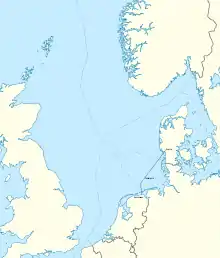COBRAcable
COBRAcable (COpenhagen-BRussels-Amsterdam cable) is a ±320 kV, 700 MW HVDC submarine power cable pair between Eemshaven, the Netherlands and Endrup near Esbjerg, Denmark. The cable is jointly owned by Energinet.dk and TenneT. Its purpose is to improve the European transmission grid and thus increase the amount of variable wind power in the system while improving supply reliability.[3][4][5] Its 700 MW capacity corresponds to an annual transmission capacity of 6.1 TWh.
| COBRAcable | |
|---|---|
 Outline of the COBRAcable | |
| Location | |
| Country | Denmark, the Netherlands |
| Coordinates | 55°31′23″N 8°42′35″E 53°26′4″N 6°51′57″E |
| General direction | northeast–southwest |
| From | Endrup |
| Passes through | German Bight |
| To | Eemshaven |
| Ownership information | |
| Partners | Energinet.dk TenneT |
| Construction information | |
| Manufacturer of conductor/cable | Prysmian |
| Manufacturer of substations | Siemens |
| Construction started | 2016 |
| Construction cost | DKK 4.7 billion; €580m.[1] |
| Commissioned | September 2019[2] |
| Technical information | |
| Type | submarine cable |
| Type of current | HVDC |
| Total length | 325 km (202 mi) |
| Power rating | 700 MW |
| AC voltage | 400 kV |
| DC voltage | ±320 kV |
Construction
The interconnector has a length of 325 kilometres (202 miles),[3] consists of two parallel cables each with a diameter of 13 cm (5.1 in)[6][7] and includes fiber-optic communication.[8][9] The connection has been designed in such a way as to enable the connection of an offshore wind farm at a later stage. This contributes to the realisation of a sustainable international energy landscape, a key aim of the European Union.[4]
On the Danish side the interconnector reaches land on the western coast of the island of Fanø and end on the mainland at the converter station near Endrup where an existing power facility has been extended with 5 hectares (12 acres). The building itself has a footprint of 125 m × 36 m and a height of 21 m. A group of local residents have collaborated with Energinet.dk in deciding the outer appearance of the building and its surrounding vegetation.[6]
The COBRAcable is a cross-border project of European significance. The European Commission has therefore allocated a subsidy to the project under the EU Economic Recovery Plan, and has designated the COBRAcable as a Project of Common Interest (PCI). In November 2015, the project was put on the EU "Projects of Common Interest" list, along with Viking Link between Denmark and England, and Kriegers Flak Combined Grid Solution between Denmark and Germany.[4][10]
Construction contracts were signed with Siemens and Prysmian in 2016[11] and in June 2016 Prysmian subcontracted the marine survey for the cable placement to the Swedish marine survey provider MMT.[12]
Onshore construction started in Denmark in October 2016[6] and in the Netherlands in January 2017.[13][14][15]
In 2015 COBRACable was expected to be operational from early 2019,[3] in Q1 2019 commercial operation was expected to start during Q3 of 2019.[16]
Operation
After tests between July and September 2019, the COBRAcable was commissioned in September 2019.[2] In its first half year of operation, it had a 79% capacity factor and transported 1,400 GWh to Netherlands and 700 GWh to Denmark.[17] It became inoperable in September 2020[18] due to a cable fault, and became operational in January 2021 after repairs.[19]
See also
- Electricity sector in Denmark
- Electricity sector in the Netherlands
- Skagerrak, 1,500 MW cable between West Denmark and Norway
- Konti-Skan, cable between West Denmark and Sweden
- BritNed, cable between the Netherlands and the United Kingdom
- NorNed, cable between the Netherlands and Norway
- Viking Link, cable under construction between Denmark and the United Kingdom
- Through Great Belt Power Link; Kontek, cable between East Denmark and east Germany
References
- http://ec.europa.eu/energy/eepr/projects/files/offshore-wind-energy/cobra-cable_en.pdf
- "COBRAcable: Interconnector to the Netherlands | Energinet". en.energinet.dk. Archived from the original on 7 March 2020.
- "Cable to the Netherlands - COBRAcable". energinet.dk. 2015-06-10. Archived from the original on 2016-01-20. Retrieved 2016-01-28.
- "COBRAcable: Interconnection between the Netherlands and Denmark". TenneT.eu. Retrieved 2018-01-26.
- "COBRAcable: From concept to conception" (PDF). COBRAcable.eu. Retrieved 2018-01-26.
- "Spadestik til Danmarks første elforbindelse til Holland" [Groundbreaking for Denmark's first interconnector to the Netherlands]. energinet.dk (in Danish). 2016-10-10. Archived from the original on 2016-10-11. Retrieved 2016-10-10.
- Arcadis (2015-05-04). "Interconnector COBRAcable Nederland–Denmarken milieueffectrapport—DEEL A" [Environmental impact report of interconnector COBRAcable Netherlands-Denmark—PART A] (PDF) (in Dutch). Netherlands Enterprise Agency. pp. A5, A34. Retrieved 2017-02-12.
- "TenneT and Energinet.dk to install data cable alongside COBRAcable". energinet.dk. Archived from the original on 2016-10-11. Retrieved 2016-10-10.
- "COBRA-kablet åbner for europæisk søvej af højhastigheds-fiber | Energinet". energinet.dk.
- "Union list of projects of common interest" (PDF). ec.europa.eu. 2015-11-18. Retrieved 2017-02-12.
- "Siemens and Prysmian will build the COBRA interconnection between Denmark and the Netherlands". Energinet.dk. 2016-02-01. Archived from the original on 2016-02-02. Retrieved 2016-02-02.
- "AWARDED CABLE ROUTE SURVEY FOR THE COBRA CABLE". mmt.se. 2016-06-14. Retrieved 2016-08-08.
- Brendel, Mischa (2017-01-10). "Aanleg COBRAcable van start" [COBRAcable construction started]. Technisch Weekblad (in Dutch). Retrieved 2016-02-12.
- "COBRAcable". TenneT. Retrieved 26 February 2017.
- "Works starts in Eemshaven on COBRAcable – a 'green' subsea electricity highway between the Netherlands and Denmark". TenneT. 3 January 2017. Retrieved 26 February 2017.
- "Preparation for including COBRAcable in the market coupling". energinet.dk. 2019-03-14. Retrieved 2019-05-25.
- "Plenty of traffic via COBRAcable | Energinet". en.energinet.dk. 6 March 2020.
- "COBRAcable is down". 4c Offshore. 25 September 2020. Archived from the original on 10 November 2020.
- "COBRAcable back in operation on January 8". www.tennet.eu. 8 January 2021. Archived from the original on 8 January 2021.